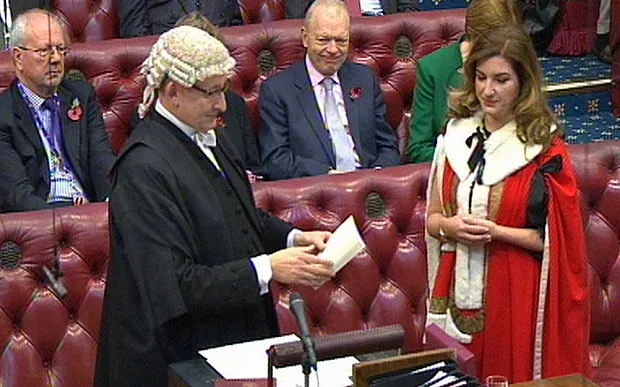West Ham Vice Chairman Karren Brady appears to have completed a U-turn on the subject of the ‘football regulator’ by using her Sun newspaper column to back David Kogan’s appointment.
Last November, Baroness Brady, who sits in the House of Lords, told her fellow peers there were “dangers lurking in this (football governance) bill” as she did her best to block it.
“Aspects of this legislation risks suffocating the very thing that makes English football so unique, the aspiration that allows clubs to rise and succeed in our pyramid system. The ambition that means fans can dream,” she said at the time.
Most Read on West Ham News
The Conservative peer Brady added that planned “extreme redistribution” would “replace our brilliant but brutal meritocracy with the likelihood of a closed shop where survival not aspiration becomes a ceiling”.
The Government later rejected calls from Karren Brady to publish a letter from UEFA which warns that domestic clubs and the England team could be banned from the Champions League and Euros over interference from the incoming football regulator.
Speaking in the House of Lords, Conservative peer Baroness Brady described the correspondence sent by European football’s governing body to the Secretary of State as “alarming” and called for it to be made public. But Labour frontbencher Baroness Twycross told Parliament it was a private letter and “there is no intention for it to be published”.
Karren Brady’s ‘U turn’ laid out in her ‘Sun’ column:
Now, eleven months later, the Baroness writing in the red top tabloid appears to have changed her mind:
“I GET it, football governance isn’t the kind of thing that sets pulses racing.
It doesn’t make for the drama of a 4–3 comeback or a late winner.
But make no mistake — an imminent appointment will shape the future of the game for decades.
I’ve always had my doubts about whether we truly need an Independent Football Regulator (IFR).
But since one is coming, we’d better make sure we get it right.

David Kogan has been chosen to chair the IFR. He’s spent decades navigating the world of media rights, sponsorships and TV deals — the lifeblood of modern football.
He understands where the money comes from, where it goes, and why that matters. That gives him insight into one of football’s big pressure points: financial sustainability.
Kogan’s experience stretches well beyond the Premier League.
He’s dealt with the EFL, Uefa, the women’s game and international bodies.
That matters, because football isn’t just about the elite — it’s a pyramid, and if the top crumbles, the base cracks with it.
The IFR needs a leader who can build transparent, robust structures. Kogan isn’t a regulator by trade, I see that as a positive.
And, more importantly, he’s worked in governance roles that demand accountability.
He’ll need good people around him — and a healthy dose of common sense, which can be in short supply in regulatory circles.
Some have questioned his political donations to Labour MPs, including Sir Keir Starmer.
Personally, I don’t have a problem with that — having political views shouldn’t disqualify anyone from public service.
His appointment still needs to be rubber-stamped by the Commissioner for Public Appointments — a process that’s dragged on since April.
Quite why it’s taking so long is anyone’s guess. Either way, Kogan will have plenty to deal with the moment he steps in.
Just look at the turmoil at Sheffield Wednesday.
Owner Dejphon Chansiri has faced furious calls from fans to sell the club after repeated financial crises — tax debts, embargoes, unpaid wages.
It’s a sad saga that shows exactly why football needs oversight that works.
Thankfully, the Football Governance Act gives the regulator more practical powers to stop another Wednesday-style meltdown.
Kogan’s team has already been out meeting clubs — including us at West Ham — to discuss how regulation can help the game.
We urged them to listen to the experience and expertise within the Premier League, where lessons have been learned the hard way over decades.
Premier League clubs will welcome a regulator if — and it’s a big if — it genuinely improves ownership standards, strengthens fan engagement, protects club heritage, and prevents breakaway leagues.
The aim must be to support well-run clubs, not punish them, or bog them down in needless red tape.
We’ve been assured that efficiently-run teams — the ones that make the Premier League the global powerhouse it is — aren’t the focus of scrutiny.
And that’s just as it should be. The Premier League remains the most competitive, most watched, most envied league in the world.

It sends £1.6billion a year cascading down the football pyramid, funding everything from local pitches to community clubhouses.
That’s a system worth protecting, not meddling with.
Kogan’s mission should now be to ensure sustainability, not insist on profitability, as football is a risky business.
Few clubs actually make money. For most owners, football is a labour of love, not a profit centre.
At the majority of well-run clubs, every penny of revenue is re-invested.
That’s certainly the case at West Ham, where our shareholders don’t take a salary or dividend and every penny goes back to the playing squad, our staff, our infrastructure, growth and development.
The key word here is ‘consultation’. The regulator must listen to those who’ve built the Premier League into the phenomenon it is today.
If they ignore that experience, and blunder into heavy-handed oversight, the damage could be severe.
Football is more than a business, it’s a heartbeat that connects millions. It’s history, identity, and pride.”

